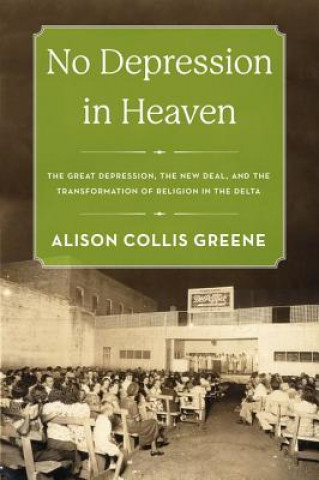
Kézbesítés
Vásárlási tanácsadó





Nem vált be? Semmi gond! Nálunk 30 napon belül visszaküldheti
 Ajándékutalvány
bármilyen értékben
Ajándékutalvány
bármilyen értékben
Ajándékutalvánnyal nem nyúlhat mellé. A megajándékozott az ajándékutalványért bármit választhat kínálatunkból.
No Depression in Heaven
 Angol
Angol
 111 b
111 b
30 nap a termék visszaküldésére


Until the Great Depression, Americans had traditionally turned to churches and religious agencies when things got tough. But the Depression exposed the inability of the Protestant establishment to alleviate suffering, and it sapped religious leaders' ability to define social crisis and compel social change, argues Alison Collis Greene. As the traditional denominations floundered, the New Deal oversaw the transfer of welfare and reform from church to state. Faced with their shortcomings, religious leaders adapted their theological imperatives to redefine the church's role in society. Although the Protestant establishment retained a central role in American life for decades after the Depression, its slip from power made room for others in American religious life. By the end of the Great Depression, mainstream Protestant denominations had moved from a central institutional role in American life to a tangential one. Upstart Pentecostals and independent evangelicals emphasized personal rather than social salvation, and they flourished. Their individualist message and streamlined institutional apparatus served them well through both the years of crisis and the prosperity that followed. This revised award-winning Yale dissertation brings to life the distinct but intersecting worlds of black and white Americans during the Depression. A collapsing cotton economy, alternating floods and droughts, and racial stratification meant that hard times came early and stayed late in Memphis and the Delta. By 1929, the region teetered on the brink of crisis and churches could no longer carry the burden. Change came quickly and relentlessly during the 1930s, and this upheaval carved new contours in the religious landscape. The ethnic and theological diversity of Memphis and the Delta included an array of black and white Baptists, Methodists, Presbyterians, and Episcopalians typical to the South, a number of Pentecostal and holiness denominations, a small but disproportionately influential Jewish community, a thriving minority of black and white Catholics, and a homegrown denomination, the Church of God in Christ (COGIC). The region embodied broader national trends in American religion during the 1930s, both despite and because of its particularities. From the poorest sharecropper in Arkansas to the wealthiest philanthropist in New York, Depression-era Americans re-envisioned the relationship between church and state and reevaluated the responsibilities of each for the welfare of the nation and its people. This groundbreaking historical study focuses on the effects of the Great Depression on American religious life, exploring the shifts in power among American religious bodies and the everyday lives of American citizens as a result of the Great Depression.
Információ a könyvről
 Angol
Angol


 Kapcsolat
Kapcsolat Hogyan vásároljunk
Hogyan vásároljunk















